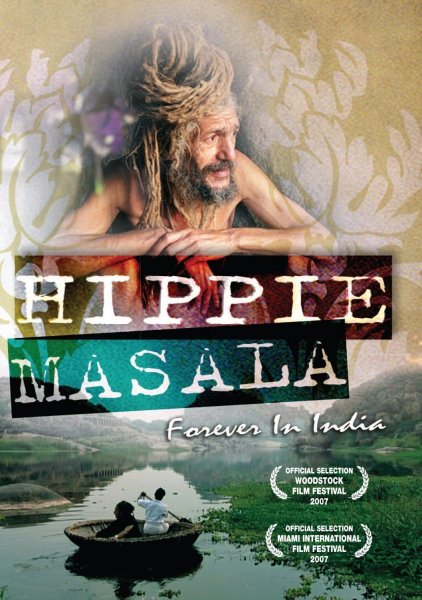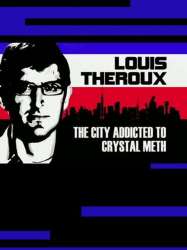Hippie Masala - Forever in India is a film of genre Documentary
Hippie Masala - Forever in India (2006)

If you like this film, let us know!
- Infos
- Casting
- Technical infos
- Photos
- Videos
- Film quotes
- Characters
- Music
- Awards
Length 1h33
Genres Documentary
Themes Medical-themed films, Films about drugs, Documentary films about law, Documentary films about health care
Rating63%










Hippie Masala: Für immer in Indien (titled Hippie Masala: Forever in India in English) is a 2006 Swiss documentary film directed by filmmaker Ulrich Grossenbacher and anthropologist Damaris Lüthi.
In 2007, the film was one of five nominated for "Best Documentary" in the Swiss Film Prize, though the prize was taken by Das kurze Leben des José Antonio Gutierrez.
The film focuses on the aftermath of the Hippie migration to Asia, specifically documenting the lives of six Hippies who chose to remain in India: Cesare from Italy, Erica and Gillian from South Africa, Hanspeter from Switzerland, Meera from Belgium and Robert from the Netherlands. No longer in their 20s, they are leading the lives of a traditional yogi and a female meditator in retreat, a painter with a local wife and children, designers of beach clothing in Goa, and a farmer who hunts and cares for his cows in the Himalayas.
^ "Swiss Film Prize: 2007". imdb.com. Retrieved 2010-04-12.
^ "Hippie Marsala". woodstock.filmfestival.com. Woodstock Film Festival. Retrieved 2010-04-12.
Synopsis
Le film est consacré aux conséquences de la migration hippie en Asie, principalement en Inde, en suivant six hippies : Cesare, l'italien, Erica et Gillian d'Afrique du Sud, Hanspeter, le Suisse, Meera de Belgique et Robert des Pays-Bas. L'un est un yogi dans une grotte, un autre a une ferme dans l'Himalaya, d'autres font des vêtements pour les hippies.Comments
Leave comment :
Suggestions of similar film to Hippie Masala - Forever in India
There are 8959 with the same cinematographic genres, 4312 films with the same themes (including 64 films with the same 4 themes than Hippie Masala - Forever in India), to have finally 70 suggestions of similar films.If you liked Hippie Masala - Forever in India, you will probably like those similar films :
 , 1h37
, 1h37Origin USA
Genres Documentary, Action
Themes Medical-themed films, Films about drugs, Documentary films about law, Documentary films about health care
Rating66%






Sex Hygiene (1942)
, 30minutesDirected by Otto Brower, John Ford
Origin USA
Genres Drama, Documentary
Themes Medical-themed films, Films about drugs, Documentary films about law, Documentary films about war, Documentary films about historical events, Documentary films about health care, Political films, Documentary films about World War II
Actors George Reeves, Richard Derr, Robert Lowery, Charles Trowbridge, Robert Shaw
Rating53%





Several servicemen relax by playing pool at their base. One later visits a prostitute and contracts syphilis. As a result of his unfortunate experience, there is an opportunity for sexual health information about syphilis, how it is spread and how its spread can be prevented.
 , 42minutes
, 42minutesDirected by Bill Guttentag
Origin USA
Genres Documentary
Themes Medical-themed films, Films about drugs, Documentary films about law, Documentary films about health care
Actors Joe Mantegna
Rating64%






Grass (1999)
, 1h20Origin Canada
Genres Documentary
Themes Medical-themed films, Films about drugs, Documentary films about law, Documentary films about health care
Actors Woody Harrelson, Chevy Chase
Rating71%





Un siècle de lutte contre la marijuana aux Etats-Unis au travers d'un portrait à la fois féroce et plein d'humour.
 , 27minutes
, 27minutesOrigin USA
Genres Documentary
Themes Films about families, Medical-themed films, Films about drugs, Documentary films about law, Documentaire sur une personnalité, Documentary films about health care, Films about psychiatry, Films about disabilities
Actors Ossie Davis
Rating71%





 , 1h36
, 1h36Origin USA
Genres Documentary
Themes Medical-themed films, Films about drugs, Documentary films about law, Documentary films about health care
Actors Woody Harrelson, Susan Sarandon, Eminem, 50 Cent, David Simon, Arianna Huffington
Rating75%





Comment faire de l'argent avec la drogue en dix étapes ? Une série d'entretiens avec des stars, des dealers de drogues, des employés de prison et des personnalités favorables à des lois plus strictes contre la drogue.
 , 1h
, 1hOrigin United-kingdom
Genres Documentary
Themes Medical-themed films, Films about drugs, Documentary films about law, Documentary films about health care, Documentary films about cities, Films about psychiatry, Films about disabilities
Actors Louis Theroux
Rating72%





 , 1h
, 1hOrigin United-kingdom
Genres Documentary
Themes Films about children, Medical-themed films, Films about drugs, Documentary films about law, Documentaire sur une personnalité, Documentary films about health care
Actors Louis Theroux
Rating72%






Al Otro Lado (2005)
, 1h30Genres Documentary
Themes Films about immigration, Medical-themed films, Films about drugs, Documentary films about law, Documentary films about health care
Rating73%






Falcão – Meninos do Tráfico (2006)
Origin Bresil
Genres Documentary
Themes Medical-themed films, Films about drugs, Documentary films about law, Documentaire sur une personnalité, Documentary films about health care
Actors MV Bill
Rating71%





 Connection
Connection